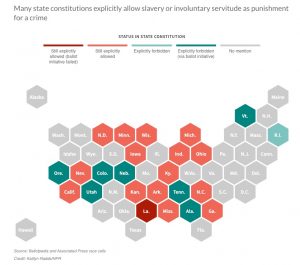
Prison Labor: What Happened in the 5 States That Had The Exception Clause On the Ballot
The 13th Amendment is the legislation that “ended” legal slavery in the U.S., it reads “Neither slavery nor involuntary servitude, except as a punishment for crime whereof the party shall have been duly convicted, shall exist within the United States, or any place subject to their jurisdiction.” While it does end legal slavery broadly, what stands out is the exception baked in called The Punishment Clause which permits involuntary servitude (slavery) so long as it is imposed “pursuant to a criminal punishment”. This clause effectively created an economic incentive for law enforcement to incarcerate people and exploit them as a source of low cost labor. A practice which continues to the present day with over 11 billion in goods made by prison labor each year. Over the last 158 years this clause has allowed the institutional racism inherent in the current justice system to legally enslave predominantly Black Americans as well as many others under the rubric of prison labor. Organizations like Freedom United and politicians like Senator Jeff Merkley, among many others, have been working to eliminate this clause at the Federal level and leave legal slavery in the past. But as written about in a previous HTS blog, this form of legal slavery was on the ballot at the state level this last November. So what were the results?
Voters Decided
Prior to the 2022 November ballot 20 state constitutions still had Punishment Clauses, or exception clauses, allowing involuntary servitude as punishment for crime. However, five states, Alabama, Louisiana, Oregon, Tennessee, and Vermont, had legislation on the ballot that would put the U.S. a few steps closer to ending legal slavery, regardless of the lack of federal action.
In Alabama, voters approved a ballot measure to overhaul the state’s constitution and rid it of racist language. As part of the revisions, the exception clause as it applies to slavery and indentured servitude was removed. Where the constitution previously said “That no form of slavery shall exist in this state; and there shall not be any involuntary servitude, otherwise than for the punishment of crime, of which the party shall have been duly convicted.” It now reads “That no form of slavery shall exist in this state; and there shall not be any involuntary servitude.” As reported in local news, Alabama Representative Marika Colemen said she believes that civil unrest in 2020 was a driving force in uniting constituents and representatives to act, and that residents of Alabama realized “there are still some inequities in this country.”
Sadly, Louisiana voters rejected the ballot measure banning slavery and involuntary servitude. The primary reason for this result may have been confusing language in the way the measure was written. “The confusion led voters to a conclusion that didn’t serve our state,” says Ashley Shelton, the president and CEO of the Power Coalition for Equity and Justice, a state civic engagement organization. However, State Rep. Edmond Jordan aims to get it back on the ballot again, hoping the measure will pass the next time through with a revision in language and more awareness raising about what the measure means.
Racist language was removed by voters in Oregon who decided to take out “all language creating an exception” and make “the prohibition against slavery and involuntary servitude unequivocal.” The constitution was also amended to allow law enforcement to order alternatives to incarceration for a convicted individual as part of their sentencing, like education, counseling, treatment and community service programs.
Tennessee was another success story with voters approving an amendment to the state’s constitution saying slavery and indentured servitude shall be “forever prohibited,” The pervading view was that the previous language was morally wrong. “I think it’s good to just get that language, the current language out of there,” said Rep. Leatherwood. Another Tennessee legislator, Rep.Larry Miller said “It seems like a no-brainer, we had the unanimous support of the House and the Senate.”
And finally, in Vermont, the first state to outlaw slavery, the measure to amend the constitution also passed. Voters cast their ballots in favor of removing the text “no person born in this country, or brought from overseas, ought to be holden by law, to serve any person as a servant, slave or apprentice, after arriving to the age of twenty-one years, unless bound by the person’s own consent, after arriving to such age, or bound by law for the payment of debts, damages, fines, costs, or the like.” Those words have been replaced with “slavery and indentured servitude in any form are prohibited.”
Victories but Still Work to be Done
It is important to celebrate these legislative victories while at the same time remembering that with the failure of Louisiana to pass their ballot initiative, there are still 16 states with constitutions and/or exception clauses that explicitly permit either slavery, involuntary servitude, or both as punishment for a crime. In addition, The 13th Amendment also still contains the Punishment Clause allowing for the same at a Federal level. Removing all constitutional exceptions to slavery for incarcerated individuals is imperative for America to finally turn the page on the ugly legacy of legal slavery in the U.S.. Exploitation and coercion are inexorably intertwined with the current prison labor system. It becomes undeniably labor exploitation and modern slavery when refusing to work can result in the loss of privileges, solitary confinement, or the denial of parole. In the words of Nicolas Turner, President of Vera. a national criminal justice reform organization “The words in our constitutions matter.”
To learn more about Prison Labor and the conversation today, watch this recent webinar Did the 13th Amendment Really Abolish Slavery? by Freedom United.

By Rebekah Enoch, Program Director at Human Trafficking Search
